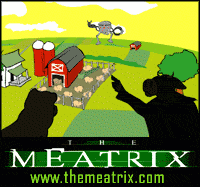
|
|
Home Editor's Note: Corporate concentration in the seed industry is deepening with implications for farmers and biodiversity. This concentration and the international legal framework which operates in its favour shifts control of agricultural decision making to a few narrow interests and away from farmers. A few seed varieties controlled by agribusiness also risks supplanting the greater variety of indigenous seeds and plants evolving in diverse ecosystems and climates and which allow them resist viruses. News Release ETC Group 5 September 2005 Global Seed Industry Concentration - 2005The ETC Group today releases a new Communique on seed industry consolidation that shows a recent upsurge in seed industry takeovers and a shake-up in rankings. According to ETC Group, the top 10 multinational seed firms control half of the world's commercial seed sales. With a total worldwide market of approximately US$21,000 million per annum, the commercial seed industry is relatively small compared to the global pesticide market ($35,400 million), and it's puny compared to pharmaceutical sales ($466,000 million). But corporate control and ownership of seeds - the first link in the food chain - has far-reaching implications for global food security. A single firm, Monsanto, now controls 41% of the global market share in commercial maize seed, and one-fourth of the world market in soybean seeds. The same company's seeds and biotech traits accounted for 88% of the total area planted in genetically modified seeds worldwide in 2004. ETC Group's report includes a table listing many of the world's top 20 seed companies and their acquisitions and/or subsidiaries. The full text of the 12-page Communique is available free of charge for download on the ETC Group website: http://www.etcgroup.org</p> IMPACT: With control of seeds and agricultural research held in fewer hands, the world's food supply is increasingly vulnerable to the whims of market maneuvers. Corporations make decisions to support the bottom line and increase shareholder returns - not to insure food security. Ultimately, seed industry oligopoly also means fewer choices for farmers. A new study by the US Department of Agriculture examines the impact of seed industry concentration on agbiotech research. The study concludes that reduced competition is associated with reduced R&D.; Despite seed industry claims to the contrary, concentration in the seed industry is resulting in less innovation - not more .PLAYERS: A fistful of transnational firms, the Gene Giants, dominates global seed sales. Monsanto, Dupont, Syngenta - all among the world's top-ranking pesticide firms - lead the pack. POLICY: Seed industry concentration is already high on the agenda of civil society and farmers' organizations that are working to support and maintain peasant and farmer-controlled seed systems and against policies and technologies that seek to further privatize seeds. The implications of seed industry consolidation for food security and biodiversity must also be urgently addressed by governments at the FAO biennial Conference in November and by the Conference of the Parties (COP8) to the UN Convention on Biological Diversity (20-31 March 2006, Curitaba, Brazil). World's Top 10 Seed Companies + 1
For more information, contact: |
| Home | Garden Monthly! | Newsletter | About Us | Contact |
|
GardenSimply.com | All Rights Reserved 2005 |

Garden Journal !!Subscribe to"Garden Notes" and plan for Harvest Success as you track and record your gardening progress. Your Free Personal Garden Journal includes printable pages making it easy for you to:
Note:Members enjoy regular updates to all our free downloads! |
|
|
|
 |
|
|
|